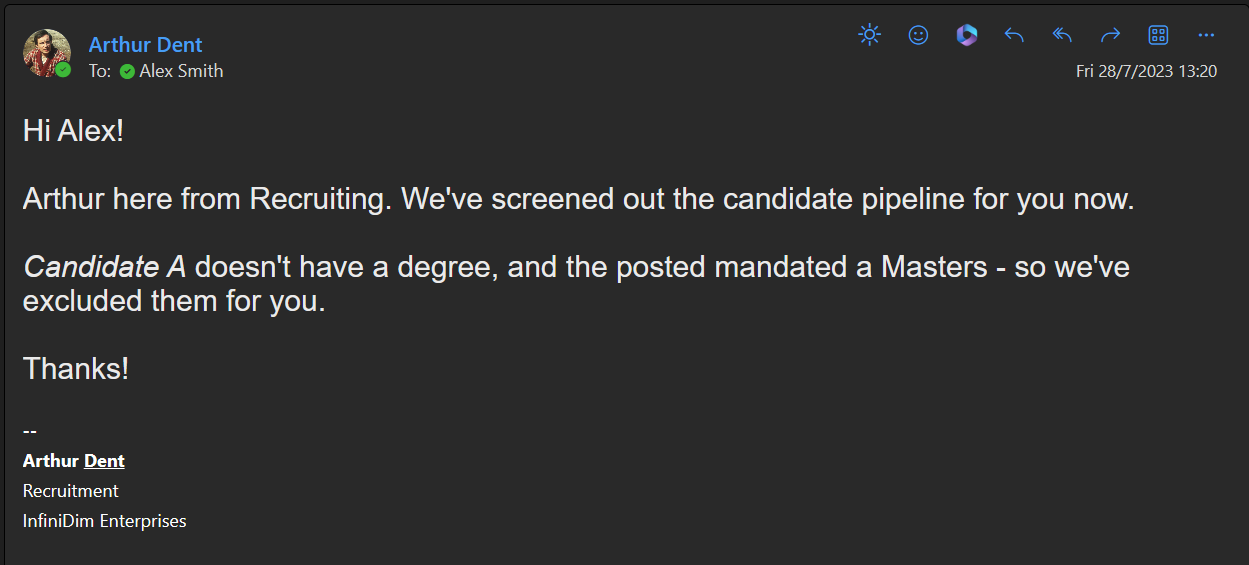
Degrees of Culture
When you hire people for a household name – you get a lot of applications: a great problem to have. As a hiring manager or sourcer you have find shortcuts to make the pipeline managable, and you have to balance the candidate pool to keep it inclusive of all types of humans. The funny thing is – I used to often get emails like this:
Hi Alex! Arthur here from Recruiting. We’ve screened out the candidate pipeline for you now. Candidate A doesn’t have a degree, and this role requires a Masters – so we’ve excluded them for you. Thanks!
You see, when I entered the workforce, degrees weren’t an optional extra or a sign of your passion. Degrees were the bar to entry, a requirement to get a seat at the table. In technology, we celebrate the founders who dropped out of Oxford and Harvard! When it came to the way we built our organisations? We went to the shortcut of “degree = capability”. This excludes incredible talent, and hampers the diversity of organisations which mandate them.
I’ve seen a shift in the market. Organisations like Microsoft still ascribe value to a degree, but do it without being exclusionary. I’ve been fortunate to influence many job postings over the last six years and make degrees a ‘great to have’. This gives a pathway to individuals who haven’t had the access to or desire for teritary education. This has lead to a surge of amazing people who:
- Join from adjacent industries and can speak to customers in a way that empathises with their language;
- Learn in a different way because they built careers without the structured learning of higher education;
- Demonstrate the entire gamut of neurodiversity;
- Create and build for people of similar backgrounds.
The side effect? When diversity is a culture in your organisation instead of a metric you manage, your organisation becomes healthier. When your organisation is healthy: your ability to deliver on the ‘hard’ business metrics improves. Every year we have seen an improvement in our inclusion culture, we have seen an improvement in our business performance. It turns out that culture really does eat strategy for breakfast.
I have a strong personal connection too. While I loved my first year of higher education, I also became involved in the Student Union. I won the elections and became the Union President, but I lost the motivation to learn. This lead to me dropping out before my 18th birthday, moving to London, and begging my network to take a chance on me.
Now decades later and having hired hundreds of people? I am finally going through formal tertiary education. Last week I completed my 3rd year of an Information Security MSc with the Royal Holloway University of London (University of London). I’m privileged to work for an employer like Microsoft. They give structured tutition assistance both financially and in work flexibility. I’m also lucky have leadership that support the #WorksForMe culture, giving me the work/life integration to study while I work.
As I enter my final year and ponder my dissertation (topic suggestions welcome, please), I am left with a new appreciation for the incredible hard work that students go through, an empathy for how better to support new graduates on their journey, and a greater-than-ever focus on improving accessibility to opportunities for every kind of person there is.
In today’s dynamic landscape, where the value of degrees is evolving and diversity is a cornerstone of organisational strength, I encourage you to challenge conventional hiring norms. By embracing the principle that diversity is not just a metric, but a cultural imperative, we create environments that foster innovation, empathy, and holistic growth. As we stand at the intersection of education, career, and inclusion, we can open doors for those who have been excluded and empower them to contribute their unique talents. Together, we can rewrite the narrative of opportunity and pave the way for a more inclusive and prosperous tomorrow.